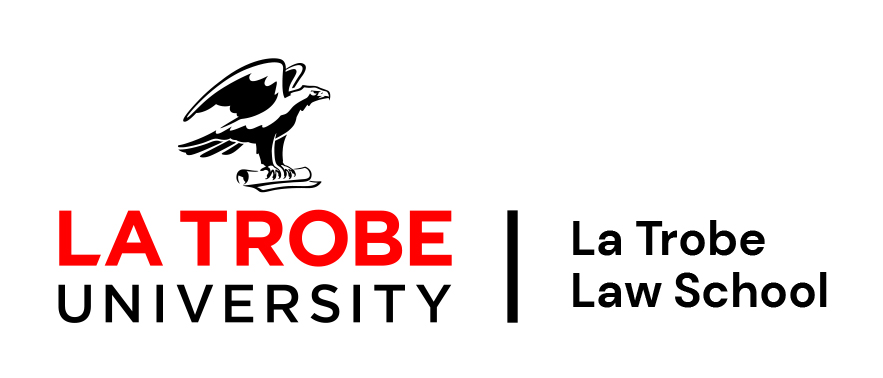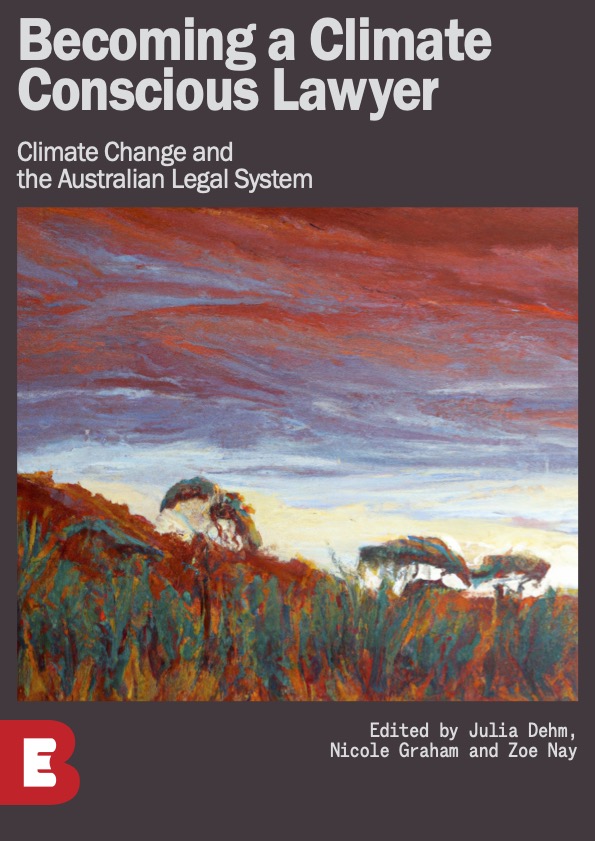Creating Educational Resources
We are developing innovative digital pedagogical resources to support the mainstreaming of climate considerations in the core law school curriculum.
Becoming a Climate Conscious Lawyer: Climate Change and the Australian Legal System
Edited by Julia Dehm, Nicole Graham and Zoe Nay (La Trobe eBureau, 2024)
As the world grapples with the escalating challenges of climate change, the legal profession finds itself at a crossroads. Becoming a Climate Conscious Lawyer: Climate and the Australian Legal System provides an original, innovative, and accessible analysis of the impact of climate change on legal doctrines and principles. It offers an overview of cutting-edge developments and how the transition to a low-carbon society is reshaping a wide range of laws.
This valuable new resource supports legal professionals, law students, and legal educators to understand current legal challenges – providing the know-how to strategically navigate, and positively influence, the development of law to respond to a climate changed world. The book delivers a transformative approach to legal education: equipping law students to become climate-conscious professionals with the confidence and competency to deliver legal solutions to a diverse range of clients, and promote climate justice across diverse communities.
Tranche 1, 2 & 3 includes the following chapters:
- Legal Education in a Changing Climate: Julia Dehm, Nicole Graham and Zoe Nay
- For the Love of Country: First Nations, Native Title and Climate Change: Marcelle Burns and Narelle Bedford
- Public Law and Climate Conscious Lawyering: Gabrielle Appleby and Joo-Cheong Tham
- Climate Change and Tort Law: Joanna Kyriakais
- Climate Change and Criminal Law: Steven Tudor and Nicole Rogers
- Climate Change and Constitutional Law: Costa Avgoustinos and Harry Hobbs
- Climate Change and Administrative Law: Anna Huggins and Ellen Hawkins
- Climate Change and Company Law: Anita Foerster and Louis de Koker
- Civil Procedure and Climate Litigation: Asha Keaney
- Evidence Law and Climate Litigation in Australia: Emma Henderson, Rachel Killean, and Mehera San Roque
- The Legal Profession and Climate Change: Vivien Holmes and Julian Webb
- Legal Theory and Climate Consciousness: Kathleen Birrell and Margaret Davies
- International Law and Climate Change: Tim Stephens
- Climate Change and Taxation Law: Celeste Black and Elen Seymour
- Climate Change and Human Rights Law: Beth Goldblatt, Cristy Clark and Julia Dehm
- Labour Law and Climate Change: Frances Flanagan and Joo-Cheong Tham
- Climate Change and Public Health Law: Belinda Reeve and Belinda Bennett
- Climate-Related Greenwashing and Australian Consumer Law: Christine Parker and Hope Johnson
- Clinical Legal Education and Climate Change: Kate Fischer Doherty, Donna Askew and Brad Jessup
- Public Interest Litigation for a Warming Planet: Brian Preston
Additional chapters will be published in late 2025 including: Land Law, Equity and Trusts, Contract Law, Intellectual Property and Technology Law, Strata Title, Migration and Refugee Law, Bankrupcy Law and Access to Justice.
“I used Becoming a Climate Conscious Lawyer for the first time in Semester 1, 2025, in my Climate Change Law course at the Adelaide Law School, and it quickly proved to be an invaluable resource. Students engaged deeply with its accessible and thought-provoking content, and it sparked meaningful conversations about the role of lawyers in addressing the climate crisis. The book prompted critical reflection on legal ethics, climate justice, and the broader responsibilities of legal professionals in a rapidly changing world.
From a teaching perspective, the book offered a clear and adaptable framework for embedding climate-conscious thinking into the curriculum. Its open-access format made it easy to integrate into weekly discussions and to share widely with students.
More broadly, the book is helping to transform legal education into a more reflective, responsive, and socially engaged discipline, one that prepares students not only with legal skills but with a sense of ethical responsibility and purpose.”
“I used Dehm, Graham and Nay’s chapter “Mainstreaming Climate Change in Global Legal Education” in the opening class of my Legal Theory course at Melbourne Law School in 2024. From my perspective, the text not only set up the course brilliantly, but also foreshadowed a more detailed consideration of the legal theoretical challenges posed by climate change and more-than-human legalities later on. The students responded enthusiastically too. Many were totally persuaded by the authors’ argument and went on to apply it in their final essays for the course. I have already committed to using the text again in 2025, and imagine I will keep using it in the future. I expect I will also draw on the book in other courses, where I have made a personal commitment – since it is not yet mandated by the faculty – to always centre environmental questions as much as possible. This is my small contribution to the broader transformation of legal education which the book so eloquently calls for. I am certain it will become a landmark text.“
“This textbook proved a most useful resource for students in grappling with the question of how climate change shapes the ethical responsibilities of lawyers today. The language and layout are pitched at an ideal level for teaching, as the text is accessible to students without over-simplifying complex issues. The ample citations point students to further relevant resources and relevant primary legal materials, and the ‘key questions’ are helpful in prompting students to reflect on how the discussion and issues are relevant to them personally. I certainly plan to incorporate this text as a core resource for students in legal ethics in the future (if I am to teach the subject again).”
Becoming a Climate Conscious Lawyer: Educators’ Companion
Edited by Julia Dehm, Kate Galloway, Nicole Graham and Zoe Nay (La Trobe eBureau, forthcoming)

Becoming a Climate Conscious Lawyer: Educators’ Companion is an essential resource for law teachers and subject coordinators. This companion volume offers innovative curriculum design, pedagogies, and classroom activities to enhance law students’ learning experiences. It equips educators with tools to inspire teaching that develops critical climate conscious skills, attributes and competencies. With practical learning activities, case studies and assessment tasks, this guide ensures students master the knowledge needed to be strategic and successful legal professionals in a climate-transformed world.
We are inviting all Australian legal academics to contribute any teaching notes – including curricular strategies, teaching approaches, learning activities and assessment formats – that fit the book’s purpose and structure.
Contributions that are accepted will be included in full as an appendix to the volume, acknowledging authorship. The book will be published under a Creative Commons Attribution NonCommercial ShareAlike (CC BY-NC-SA 4.0) licence. Through a creative commons licence, the lead authors may draw on, adapt, or include excerpts from any contribution to illustrate practice within the text of the book. Any use of contributions will be attributed by link to the relevant contribution. All contributors will be named in the preface of the book.
To contribute, please submit a teaching note here.
Join our Mailist
We are grateful for support from

We pay respect to Elders, past and present, and acknowledge the pivotal role that Aboriginal & Torres Strait Islander people play in addressing challenges faced by climate change and climate resilience.
Contact us
Header Imge: Aerial Panorama shot of Sta. Cruz Island Sand Bar, Zamboanga City, Aldous Mariano Cariño File:Sta. Cruz Sand Bar.jpg – Wikimedia Commons.
Website by ActionSkills
